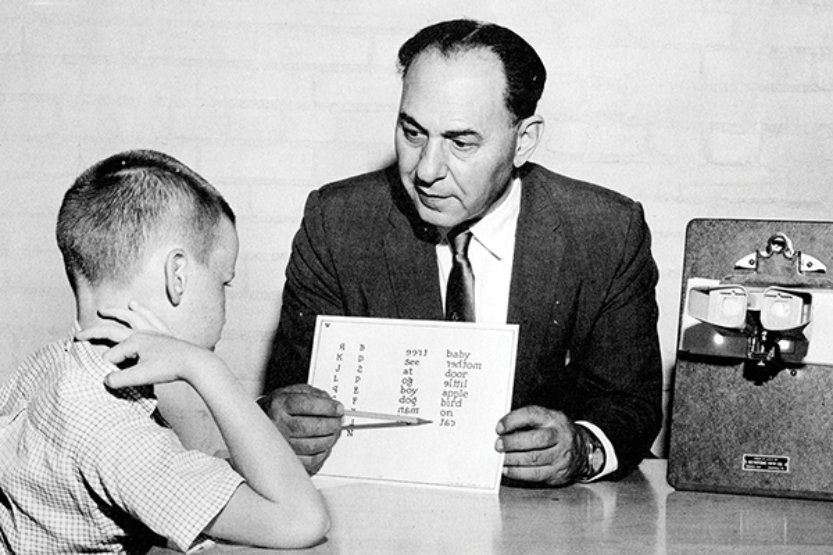Ingenious: The father of special education
 Samuel Kirk championed the 1969 Children with Specific Learning Disabilities Act and advocated for provisions for highly specialized diagnostic remedial teachers. Kirk’s brother Victor remembered him as a man who had patience and “a knack for instruction.” (Image courtesy of UI Archives)
Samuel Kirk championed the 1969 Children with Specific Learning Disabilities Act and advocated for provisions for highly specialized diagnostic remedial teachers. Kirk’s brother Victor remembered him as a man who had patience and “a knack for instruction.” (Image courtesy of UI Archives) Samuel A. Kirk recalled that just before a 1963 conference in Chicago, a friend of his said, “We’re going to ask you to give us a term” to describe children struggling with a wide range of behavioral issues.
Although Kirk questioned whether this was even possible, he did coin the term “learning disabilities” at that conference to describe children with disorders in speech, reading and associated communication skills.
Kirk, a University of Illinois professor for most of his career, is called the father of special education, but not just because he came up with the term “learning disabilities.” In addition to his landmark research, Kirk’s most lasting contribution, some say, was promoting the training of special education teachers. He championed the 1969 Children with Specific Learning Disabilities Act, which drew from his research and ignited the spread of special education.
In a 1964 paper at a Princeton University conference, Kirk cited the case of a four-year-old girl who was diagnosed with an intellectual disability and recommended to be institutionalized. After a graduate student worked with this girl three days a week for more than two years, she was able to function in a regular class. She was not institutionalized.
Kirk used this example to argue that there “must be provisions in our schools for highly specialized diagnostic remedial teachers.”
The son of Lebanese immigrants, Kirk was born on a North Dakota farm in 1904. The farmhands slept in the barn, and on rainy days they often would gather around the young Kirk as he gave them reading lessons.
“He had patience,” recalled Kirk’s brother Victor when thinking back on those loft lessons in a New York Times obituary in 1996. “He had a knack for instruction.”
Kirk initially studied philosophy at the University of Chicago, but his career path changed dramatically in the 1920s while working with boys that had intellectual disabilities at the Oaks School in Chicago. As a result, he shifted to clinical psychology at the University of Michigan.
Kirk came to Illinois in 1947, where he pushed for the creation of the Institute for Research on Exceptional Children in 1952, the world’s first multi-disciplinary research unit to focus on exceptional children and learning disabilities. He served as its first director from 1952 to 1968.
Kirk also developed groundbreaking evaluation techniques that became the Illinois Test of Psycholinguistic Abilities in 1961. This test measured language, memory and cognitive abilities in young children.
After Kirk’s well-known speech on learning disabilities in 1963, President John F. Kennedy called him personally to ask him to serve as director of the Office of Education’s Division of Handicapped Children in 1963 and 1964.
Although Kirk is best known for coining the term “learning disabilities,” he was skeptical about using technical labels for patients. In the 1963 speech, he said, “I often wonder why we tend to use technical and complex labels, when it is more accurate and meaningful to describe behavior. If we find a child who has not learned to talk, the most scientific description is that he has not learned to talk.” —Doug Peterson
Sources: University of Illinois: Engine of Innovation, University of Illinois Press, 2017; University of Illinois Archives; “Dr. Samuel A. Kirk, 92, Father of ‘Special Education,’” New York Times, July 29, 1996.

